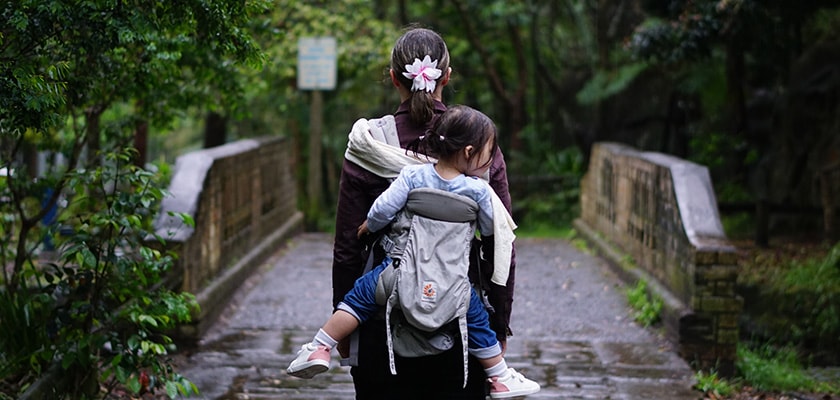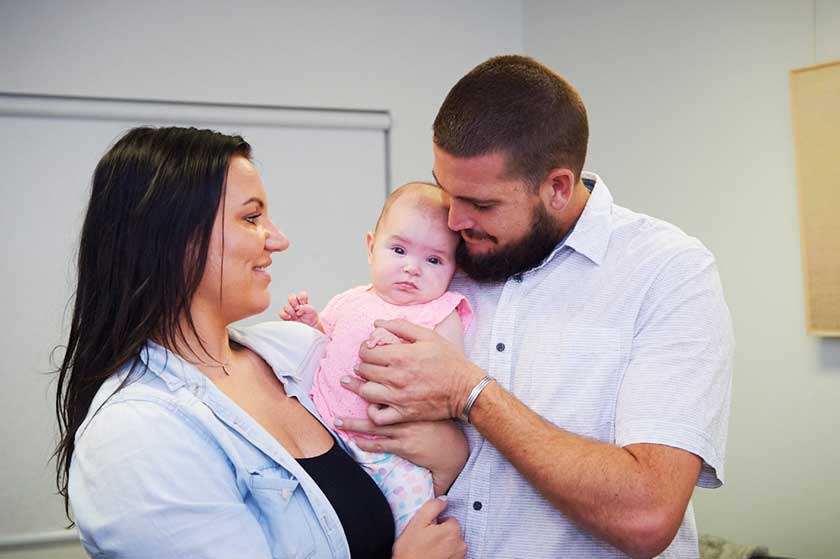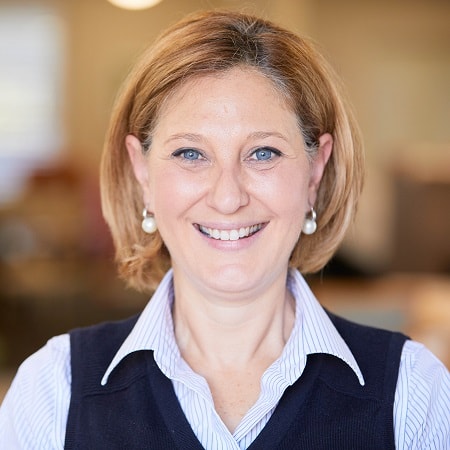I loved being pregnant, it was the happiest time of my life and I was carefree and excited for the future. It was a truly great time for me. Throughout the pregnancy I had zero side effects, my baby was healthy and I even continued to go to the gym until the six month mark.
What followed was a shock that I wasn’t expecting or anticipating.
I had high expectations for the birth of my daughter. I wanted, and succeeded in having a completely natural, non-invasive birth with my husband’s support. I had a long 36 hour labour with some gas but no epidural. I was determined to push my baby out and feel the whole experience.
I went home six hours after her birth. I could have stayed the night but it was a shared room and my husband couldn’t stay with me.
I was riding the ‘baby high’ for four days but then crashed spectacularly on day five when it wore off. I felt like I was supposed to have an instant bond with my daughter but I found zero enjoyment in the normal baby duties like changing nappies and feeding.
At one-week post-birth anxiety kicked in. I recognised it as I had experienced it in my twenties and had gotten it under control with professional help. Given I had managed it before I thought I could do it again.
Within a day this became extreme anxiety and insomnia which then suddenly developed into a terrible depression. I felt completely hopeless, couldn’t get out of bed, had no appetite and felt despair and apathy which terrified me. Everything was overwhelming and I was tormented by invasive thoughts about horrible violent things happening to my daughter.
Thankfully, my assigned midwife came to visit me at one-and-a-half-weeks post birth and, seeing how much I’d changed, organised for me to complete the Edinburgh postnatal depression test. The results confirmed that I was indeed depressed.
I went to see my psychologist who had helped me with anxiety previously but there was no improvement so my midwife encouraged me to come back to hospital. She found me a room in the antenatal ward and I was placed under the care of a crisis team with a mental health nurse and psychiatrist.
During this time I knew something was wrong but I convinced myself that I was just incompetent as a mother and a failure. I couldn’t justify this reaction in my mind as I was happily married and celebrating our ninth wedding anniversary that year. I had a very comfortable life and felt ungrateful, convinced that other people had far more valid reasons for depression.
While in hospital I learned of the Mother and Baby Unit at St John of God Burwood Hospital and the team organised for me to be admitted. I was so terrified and convinced I needed help being a mum so the idea of the program gave me some comfort.
Admitted to the Mother and Baby Unit
My daughter was two-weeks and two-days old when I was admitted to St John of God Burwood Hospital and I honestly don’t know how much longer I would have lasted if I had stayed at home.Packing a bag to go to hospital felt strange. Initially I thought I would only need comfy clothes like tracksuit pants and slippers, but once I had been there for a while I realised dressing like I normally would at home with nice casual clothes helped my mood. So I had some brought from home and did some shopping throughout my stay.
Entering the facility was confronting particularly as the team went through my bag on arrival and again when I realised that all the touch points were anti-ligature. On arrival there was a constant stream of questionnaires which left me exhausted.
I was assigned a psychiatrist and their medical registrar for the duration of my stay. Taking medication was dependent on my condition and personal preference. At first I was against going on antidepressants but decided to do so after speaking to my doctor. It worked as a band aid and regulated my mood so I could focus on therapy and my recovery.
For the first two-weeks it felt like I was in a bit of a fog, unable to see my way out. It took a couple of weeks of being in hospital before I was able cut myself a bit of slack, stop beating myself up, allow myself to mourn my former life and start healing.
Routine
Mornings were the worst, I would lie in bed trying to psych myself up to get out of bed and then would be faced with the daunting challenge of deciding what to wear. I later learnt to prepare my clothes for the next day in the evenings when my mood was a bit better.The program gave me a routine that I had craved. Every morning we would have a check-in where we shared how our mood was currently and then go for a walk through the local park. I had a timetable and knew what to expect each day, there were morning and afternoon group sessions with people to mind my baby so that I could participate without being distracted.
When I first arrived I couldn’t leave the building until I was assessed by the doctor.
Then, for the first two-weeks, you could go out if you were accompanied by someone. I enjoyed going to Burwood Westfield, local cafés and the open green spaces.
After experiencing my lowest day, where the depression and distress held me completely captive, I turned a corner and started to recognise that the mental illness was not my fault. That it was an unfortunate combination of physical, hormonal, psychological and environmental factors. I began to trust my doctor and surrendered myself to the recovery process.
Why the Mother and Baby Unit worked for me
- All the elements of care were easily accessible and contained within the building, it reduced all barriers to participation.
- I took every opportunity to talk about my feelings. I would spill my guts out to every single nurse and at the beginning I cried in every single session.
- A massive advantage was having my husband stay with me and having his support on a day-to-day basis.
- We had our own room that was like a hotel with a nice bed, television, bathroom, separate alcove for the baby and view to the garden.
- Being with a group of women who were going through the same thing as me was comforting as you realise you are not alone. I am still in touch with some of the mums from my stay and it is helpful to have a support network that understands you.
- Group therapy sessions were very helpful, and I particularly enjoyed the ‘singing with babies’ sessions as I am a musician.
- My faith and prayer was very important and being at St John of God Hospital meant there were pastoral care workers that I could speak to about my spirituality and a chapel where I attended a healing service. My experience challenged my faith in God but the visual signs of Christ on the cross gave me hope that my suffering would pass and helped me cope.
After hospital
I spent four-weeks at the Mother and Baby Unit and after I was discharged I completed a six-month group therapy outpatient program and saw my psychiatrist regularly.My baby is now 17-months old and life is pretty wonderful. I work as a music teacher and composer and my life is fuller now than it has ever been.
I have recovered from depression but being human, I’m still vulnerable and the path of personal insight will always be an ongoing one. Life is still going to happen, and if that ever triggers another episode in me at least now I have the experience to know how to manage it and where to reach out for help.
I hope that by sharing my story other women will understand that there’s no shame in experiencing postnatal depression. Mental health doesn’t discriminate, it can happen to anyone but it is helpful to learn the symptoms and know that there is always help available.
Please note: there have been some changes to day leave and visitors at the Mother and Baby Unit to keep patients and caregivers safe since the COVID-19 pandemic.







